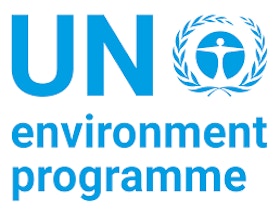Beneath the picturesque turquoise waters of Trinidad and Tobago, plastic pollution is wreaking havoc on marine ecosystems. Every year, more than 88,600 tonnes of plastic waste is deposited into the ocean around the Caribbean nation, harming marine life and ultimately impacting human health.
“Plastic is everywhere. And plastic is overwhelming us,” says Sarah Sobrian, a 28-year-old environmental campaigner and member of RSC, a technology non-profit.
A new app is aiming to help young people in Trinidad and Tobago, along with other small-island developing states, counter the damage done by plastic pollution. Called Tide Turners, the app was developed by the United Nations Environment Programme (UNEP) with the help of young people, like Sobrian. It challenges users to record their plastics consumption and develop an action plan to reduce their use of the material.
Among other things, it encourages people to switch to reusable products and go plastic-free where possible, lifestyle changes that experts say can help stem the flow of plastic into the world’s oceans, which has reached crisis levels.
“The Tide Turners app is designed to empower young people to affect change,” said Llorenç Milà i Canals, the head of the UNEP-hosted Life Cycle Initiative, which works to counter plastic pollution. “By changing their own behaviours around plastic use and getting their friends, families and communities to do the same, young people can have a significant impact.”
Plastic pollution is a pressing issue that affects all small island developing states, a formally recognised group of 39 island nations. Every year, 19 to 23 million tonnes of plastic are dumped into the world’s oceans, rivers and lakes. Between 70 and 85 per cent of marine litter in the Caribbean Sea comes from land, most of which consists of plastics.
Reducing plastic pollution, experts say, will take a concerted effort from governments, businesses and, critically, youth. Children account for around 30 per cent of the population in small island developing states in the Caribbean, while people under the age of 25 account for up to 60 per cent of the total population in some small island states.
To tackle the plastic pollution challenge, the new app builds on UNEP’s Tide Turners Plastic Challenge Badge, which has so far engaged more than 500,000 young people involved in youth groups like the Scouts and the Guides. Along with calling on youth to use less plastic, it encourages them to start advocacy campaigns and raise awareness about the dangers of plastic pollution.
The app was developed under the UNEP-led ISLANDS Programme, which is funded by the Global Environment Facility. The app includes a leaderboard and story-sharing functionality, allowing young people to track and share their progress in countering plastic pollution. The app was developed in collaboration with young people from Small Island Developing States (SIDS) and is targeted at those aged 12–25.
Turning the tide
Humanity produces around 430 million tonnes of plastic a year, two-thirds of which is contained in short-lived products that soon become waste. The social and economic costs of plastic pollution reach up to US$600 billion per year. Exposure to plastics and microplastics can harm human health, and open burning of plastics contributes to air pollution and emissions of persistent organic pollutants.
ISLANDS supports 33 small island states in achieving safe low- and non-chemical development pathways, including using less plastic. Through its projects in the Caribbean and the Pacific, ISLANDS expects to engage over 100,000 young people in combatting plastic pollution. Globally, it aims to reach over 9 million people and avoid over 300,000 tonnes of marine litter.
The push comes as governments and other stakeholders work to forge an international legally binding instrument on plastic pollution.
In Trinidad and Tobago, Sobrian, who tested an early version of the app and advised on its development, is keen to get started.
“The Tide Turners app is an incredible tool that educates and empowers us to change the situation we face,” she says. “I am incredibly eager to be a part of this and share this experience with those in my life. With this app, we can and will work together to create the impact that we have wanted to see.”
To fight the pervasive impact of pollution on society, UNEP launched #BeatPollution, a strategy for rapid, large-scale and coordinated action against air, land and water pollution. The strategy highlights the impact of pollution on climate change, nature and biodiversity loss, and human health. Through science-based messaging, the campaign showcases how transitioning to a pollution-free planet is vital for future generations.
The Implementing Sustainable Low and Non-Chemical Development in Small Island Developing States (ISLANDS) Programme is a $515-million, five-year initiative backed in part by the Global Environment Facility, which is providing $75 million. It supports 33 small island developing states in four regions – the Atlantic, Caribbean, Indian and Pacific oceans – to reduce and manage hazardous waste and improve chemicals management in their territories. ISLANDS is led by UNEP, in cooperation with the United Nations Development Programme, Food and Agriculture Organization of the United Nations, and the Inter-American Development Bank.
Publish your content with EB Publishing
It's about who you reach. Get your news, events, jobs and thought leadership seen by those who matter to you.









